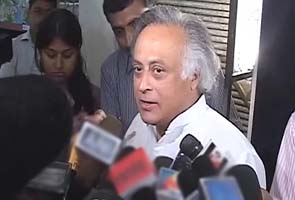 New Delhi, May 21: The monthly pension of Rs. 200 given to the elderly is "an insult to the dignity of an individual", Rural Development Minister Jairam Ramesh has said, requesting Prime Minister Manmohan Singh to immediately review the scheme.
New Delhi, May 21: The monthly pension of Rs. 200 given to the elderly is "an insult to the dignity of an individual", Rural Development Minister Jairam Ramesh has said, requesting Prime Minister Manmohan Singh to immediately review the scheme.
In a letter to the Prime Minister, the minister has recommended streamlining the disbursal system of Indira Gandhi National Old Age Pension Scheme (IGNOAPS) under which Rs. 200 per month is given to three crore people over the age of 60.
"I have always held the view that the amount of pension that we are giving is an insult to the dignity of the individual," he stated in his letter dated May 16.
The minister raised the issue after a meeting with the convenors of Pension Parishad, Baba Adhav and Aruna Roy, few days back.
The key demands of the Parishad include removal of the poverty line criteria while implementing the pension scheme, increasing the amount of pension from Rs. 200 to Rs. 300 and reducing the age eligibility from 60 years to 55 for men and 50 for women.
"I agree with the Pension Parishad that use of BPL and APL criteria should be done away with. We are proposing to do away with the BPL and APL criteria in the sanitation programme and in the national rural livelihood mission (NRLM) as well," Ramesh wrote in the letter.
On timely disbursement of pension, he noted, "Pensioners do not get monthly payments but get them bundled together once every few months. The immediate task is to restructure the pension payment architecture so that pensioners get the amount on an assured date in the bank account every month."
He further added that he has recommended the same for the Indira Awas Yojana (IAY). "Even in the IAY, I have written to Deputy Chairman, Planning Commission that the BPL and APL criteria has only ended up ensuring that deserving families do not get that benefit," Ramesh said.
The Rural Development Ministry has already submitted a proposal in this regard to the Finance Ministry.
Ramesh, however, disagreed with the Parishad's suggestion to lower the eligibility age for pension from the present 60 to 55 for men and 50 for women.





Comments
Add new comment